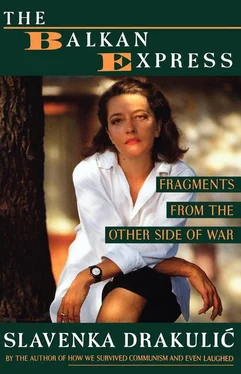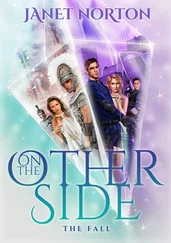We enter Sunja. In front of a wooden house a snowman is melting. Most houses in the main street have been hit, the railway station, the former cafe, the clinic, shops. The street is completely empty, there are no cars or passers-by, no children and no dogs. There are no sand-bags here as in Zagreb, placed to protect shelters and basements; here sand does not help any more. Here and there the holes in the buildings where the doors to the houses used to be are boarded up with planks. There is no glass in the windows, just plastic sheets. Josip laughs, says there are no longer any glaziers here who could repair the windows and it’s not worth the trouble anyway. The shelling never really stops so the soldiers distributed plastic sheets for people to stretch over the window frames instead of glass – at least those people who have remained. We come to the church. The parson rides by on his bicycle but does not stop. Emaciated and bowed low over the handlebars, he rides on because the church entrance is locked and the church tower reduced to a heap of rubble. The church clock has toppled from the tower and broken in two. Now the two halves of the clock loom from the debris like two halves of life, split into peace and war. I look at the sky and the ruined eighteenth-century tower of St Mary Magdalen’s. Suddenly I realize I am standing in the middle of the cemetery. I look about me at the empty sky, the dead street, the caved-in roof of a house nearby, at the eerie absence of life, the shattered time-piece, and a lump forms in my throat. Standing there, I feel I am approaching an edge, an abyss, a turmoil of feelings which I cannot identify, but know is dangerous, and I know I must stay away from it, because then it would be too late for reason, for doubts, even for fear. While I stand there, everything clicks into place with perfect clarity: they attacked us, we responded. Here, war is a simple matter. There are no politics any more. No dilemmas. Nothing but the naked struggle for life. I know that if I had to stay here, this would soon be my reality too.
I must have been standing in the churchyard for too long, because my teeth begin to chatter. Josip gently takes me by the arm and leads me down what used to be the main street of Sunja. In the meantime the daylight has turned to dusk and now the darkness is falling swiftly like a curtain. We pass some shops. The glass of the shopwindows lies shattered on the floor and the shelves are completely empty. But on one shelf, the bottom one, I count nine salt cellars made of light-blue china. I stop and count them, I don’t know why. Or perhaps I do: because this is the true picture of devastation. There is not a single person in the village who’d buy or even steal the salt cellars, not a single soul who could have any use whatsoever for the salt cellars. Getting into the car, I grow tense, realizing how deceptive the peace and quiet is, as if I can already feel the lurking eyes of the soldiers on the other side.
While we are being ferried across the murky, dark Sava (they tell me that at this very spot they had seen corpses floating on the water), Josip is silent, deep in thought. He told me he was thirty-three years old and was in fact a construction engineer. His face looks quite young and nothing in it reveals his age except two vertical lines cut deep at the corners of his mouth. I don’t ask him anything more. Looking at the muddy road in front of us, again I count the blue salt cellars in my mind. Then, quite unexpectedly, I hear Josip’s voice saying, No, no, as if he is arguing with himself about things I wouldn’t be able to understand anyway. No, he repeats, now looking at me. After the long silence, his words sound strange. I lower my eyes, uncertain whether he is really talking to me. No, the treachery of friends was not the hardest thing, the hardest thing is to kill a man, he says, and uttering those words he stops the car, turns in his seat towards me and looks me straight in the eyes. I stare back at him numbly, I don’t think I expected this. Not for a moment since we shook hands and introduced ourselves had it occurred to me that a man who had been fighting for six months must have done it, must have killed someone. I watched him, our shoulders almost touching in the narrow space of the car. I watch his hands on the wheel and feel beads of sweat break out on my forehead. He is saying it, this sentence that no one dares to say out loud in public. The entire horror is compressed in it: war is killing. The sentence hangs in the air between us like a living thing. What hits me at the moment are two things: his closeness and his awareness of what has happened to him. I still cannot quite grasp what he is saying, or perhaps it would be better to say I refuse to grasp it – it is always somebody else who is doing the fighting, not the people we meet, talk with, have coffee with, travel, work or shake hands with.
It was summer, he is telling me, and a few of us surrounded this man, a Chetnik, in a house at the edge of the village. We hid in the tall grass some twenty metres from the house and waited for him to come out. Hours went by, the heat was terrible, but we couldn’t move. We knew that any second he would run out of ammunition and then he would try to break loose and bolt. I had gone hunting a couple of times before and at first this felt very much like lying in wait for an animal, no difference. I know that at some point sweat began to pour down my forehead and that I suddenly remembered Camus’s Stranger . The scene on the beach before he starts shooting at the Arab. I know , I thought, I know that scene. I could almost see Josip there, lying in ambush. He must have licked his salty lips and a blade of grass tickled his neck but he could not move. Then something must have happened in the surrounded house, so his muscles tensed and at that moment … But I did not shoot, continues Josip, nobody did. It was our first ambush and we wanted to be sure we wouldn’t miss. I had the best position and sometime around noon I could tell that the man inside was getting edgy, he kept looking out, I often saw him near the windows of the house. At one moment I had him in my sights, I could see clearly his long, thin face surrounded by dark, longish hair. And his eyes, the eyes of a man who knew what was going to happen. I remember that my lips were dry as I squeezed the trigger and I thought, I mustn’t miss, I mustn’t miss. But I did not pull the trigger. It’s hard to kill a man. Next time, next time Josip did shoot and after that there was no going back for anyone. Then Josip says the war made a murderer out of me, because there was nothing else to do but to fight back. The last part of the sentence he says so softly I can hardly hear him.
A girl passes us on the road riding a bicycle. She waves to us. Josip waves back, maybe he knows her. This simple gesture seems to dispel the heavy, sinister shadow cast by his grim words. Fat white geese waddle in the yard of a bombed house we pass. A little farther down the road, a woman is washing the windows of a house with a damaged roof. I can see the notion of war expand to encompass the small, everyday things, from weddings and geese to window washing – the whole, rounded reality. Travelling back to Zagreb, I think how another peaceful day at the front has gone by.
That night, at three o’clock in the morning, Sunja came under fierce mortar attack.
ZAGREB FEBRUARY 1992
11
MY MOTHER SITS IN THE KITCHEN SMOKING NERVOUSLY
‘What do you think. Will they tear his tombstone down?’ My mother sits in the kitchen, smoking nervously. It is winter, draughts of cold wind sweep under the balcony door. She talks about Father. In two years since his death her face has changed completely, most of all her eyes. She seems aloof, distant. She has never been close to me, and now I can hardly reach her, except her quite palpable fear. She does not know how to speak of her fear, the words seem to come unstuck from her lips painfully and then, hard and rounded like pebbles, scatter on the table, falling into the ashtray, into the coffee cup which, when she is not smoking, she grips tightly in both hands. I try to catch them, to string them together with the words she is still holding inside herself, because by now she is frightened of their very sound.
Читать дальше












